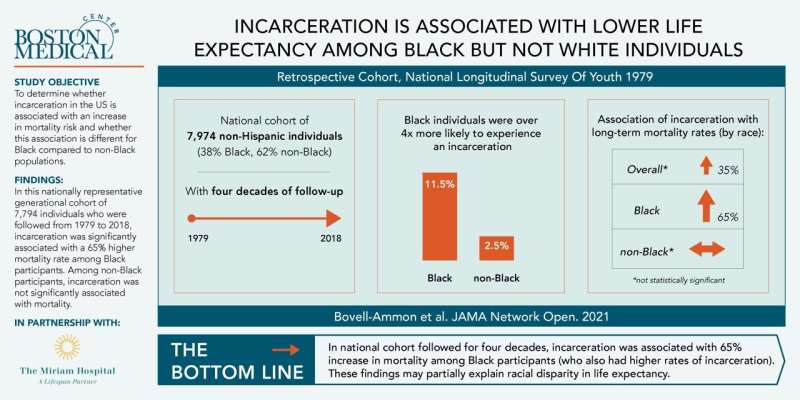

A new study led by researchers at Boston Medical Center shows that Black individuals who were incarcerated experience higher mortality rates post-incarceration compared to non-Hispanic non-Black individuals who were incarcerated. Examining a national cohort that was followed over nearly four decades, the analysis identified that following incarceration, Black individuals had a statistically significant 65 percent increase in mortality whereas no statistically significant association was observed for non-Black individuals. Published online in JAMA Network Open, the researchers signal that these results may impact the disparities in life expectancy between Black and non-Black individuals in the United States.
The United States incarcerates a greater number and proportion of people than any other country in the world—with a dramatic increase in incarcerations in the last four decades. This exhibits as a form of structural racism because this increase has disproportionately impacted non-White groups, particularly Black men. Prior research has shown that after incarceration, the initial process of transitioning back into life in the community is a very stressful and dangerous period where the risk of death is extremely high, particularly due to drug overdose, among many other health threats. However, few studies have been able to look at the long-term impacts that incarceration has on health over the years that follow.
“Our study results show that the experience of incarceration can lead to substantial, long-lasting harm to someone’s health, in the form of higher mortality rates in the years following incarceration, and this effect was much greater among Black individuals than others,” said Ben Bovell-Ammon, MD, MPH, a visiting fellow in general internal medicine at Boston Medical Center and a postdoctoral research fellow at The Miriam Hospital in Providence, which supported the research project.
In this retrospective cohort study, researchers analyzed data from the National Longitudinal Survey of Youth, which included non-institutionalized young adults between the ages of 15 and 22 in 1979. These individuals were followed up until 2018. There were 7,794 individuals included in the sample, and 50 percent were male and 38 percent identified as Black.
After a median follow-up period of 35 years, 478 participants had experienced at least one incarceration and 818 had died. When the data were stratified by race, there was a statistically significant association between incarceration and mortality for Black participants, but not among non-Black participants. This study did not examine causes of death.
According to data released by the Center for Disease Control and Prevention, life expectancy in the US for non-Hispanic Black individuals is significantly less than non-Hispanic white individuals. Between 2019 and 2020, life expectancy decreased from 74 years to 72.7 years for non-Hispanic Black individuals. During that same time period, life expectancy for non-Hispanic white individuals went from 78.8 years to 78 years.
Source: Read Full Article